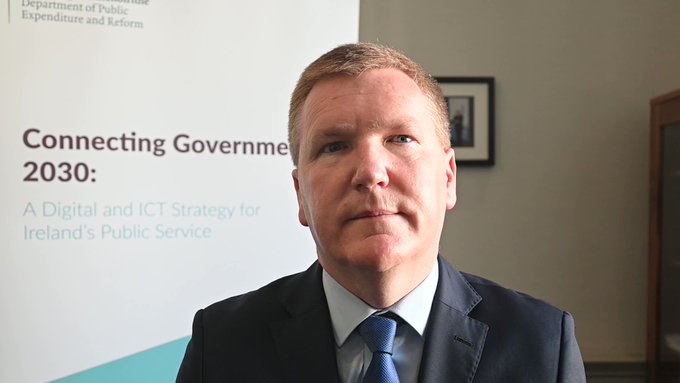The Minister for Public Expenditure and Reform, Michael McGrath TD, and the Minster of State for eGovernment, Ossian Smyth TD, launched Connecting Government 2030: A Digital and ICT Strategy for Ireland’s Public Service.
This strategy addresses the digitalisation of public services dimension of the new national digital strategy, Harnessing Digital – The Digital Ireland Framework. It also aligns with the targets set out in Civil Service Renewal 2030.
For individuals, Connecting Government 2030 aims to provide:
• Better access to trusted, high quality digital government services;
• Services that are delivered in an equitable, inclusive and sustainable manner with better service to those who need assistance;
• Secure and transparent reuse of personal data; and,
• Opportunities to co-create government services, rather than relying on the assumptions of government.
For businesses:
• Better access to integrated digital government services;
• Reduced administrative overhead;
• GovTech opportunities; and,
• Greater openness and engagement with government.
A key focus of Connecting Government 2030 is on delivering public services taking a digital by default approach through collaboration with stakeholders and the public, building towards 90% online uptake of key public services in line with the targets set by the EU’s Digital Decade.
Speaking at the launch, Minister McGrath said, “I am delighted today to be publishing this new Digital and ICT Strategy for Ireland’s Public Service. We have seen a great improvement in the provision of online public services over recent years. But we must build on those strong foundations and accelerate how we progress into the future. Connecting Government 2030 provides us with a framework to do this and to create world-leading digital government services while at the same time improving the off-line experience for those who are unable to access services digitally.”
“The ambitions set out in Connecting Government 2030 also reflect my overall strategy of reform and innovation which my Department is pursuing. My aim with this strategy is to provide better public services for individuals and businesses. The strategy also builds towards the reform targets set out in Civil Service Renewal 2030 and fulfils commitments in the Programme for Government.”
Connecting Government 2030 notes that digitalisation by itself is not enough. What is required is digital transformation of government: redesigning and rebuilding government processes and services including across organisations, if necessary.
Minister of State Smyth said, “in government, we must continuously examine how our public services are delivered and how digital technologies and data can assist in that delivery. This new strategy, Connecting Government 2030, guides us towards achieving this ambition.”
“Successful digital transformation will ensure digital channels are the preferred way for people to access public services. We must continue to make services as seamless, user-friendly and accessible as possible. Digital transformation is not a project – it must be central to government policy-making and culture.”
Recognising that digitalisation contributes to broader socio-economic development, Connecting Government 2030 will also drive the wider GovTech priorities. A key element of the strategy will be to give all stakeholders a voice in identifying priorities and to co-create digital government services.
Implementing Connecting Government 2030: A Digital and ICT Strategy for Ireland’s Public Service will take an all-of-government effort to deliver its ambitious outcomes. It will be overseen by the Office of the Government Chief Information Officer, based in the Department of Public Expenditure and Reform.













